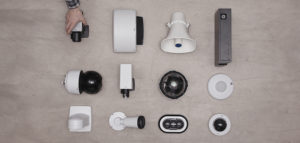9 questions to consider before purchasing a recording solution
Purchasing the right video management and storage technology isn’t always easy. You often need to consider a number of factors before you feel comfortable enough tying your business to any kind of surveillance hardware. The result could ensure you’re using a recording solution that will meet (or even exceed) your security objectives. To simplify your selection process, here are nine questions many could forget to ask before selecting a network video recorder for their business.
1. Is the NVR easy to install?
You have enough to worry about while running a business. That’s why it’s critical to find security technology that makes your life easier, not more difficult. Fortunately, some network video recorders come out of the box ready as a plug-and-play solutions. These NVRs are preloaded with video management software (VMS), licenses and all the features you would need. This means that installation is quick so you can begin efficiently monitoring your business in no time.
2. Is the NVR easy to use?
While installing an NVR may be simple, if it’s difficult to operate, users may have a hard time navigating the system or reacting quickly to an incident. Video management systems with intuitive interfaces allow users to painlessly monitor business environments with features such as easy-to-identify icons, menus that are simple to navigate, and the option to operate a pan, tilt, zoom camera with just a few clicks. Customizable settings such as rotating live-views, imported site maps of your location are all examples of things that can add to the simplicity of use.
It can be challenging to think of all the features that would make a recording solution “easy to use”, so don’t be afraid to ask your system integrator for a live product demo. In some cases, a free trial period could ensure it will fit the needs of your operation.
3. Does the NVR easily integrate with other systems on the network?
Not all IP cameras are compatible with every NVR because not all operating systems can communicate with each other. However, there are IP products on the market that are built with an open platform, so devices made by different manufactures can work or integrate together. Therefore, as long as the NVR is built on an open platform, it can likely integrate with other systems on the network.
When systems allow for third-party integration, users could have the ability to operate and manage various devices on the network all from one place. This means you could open a door with a click within the VMS interface, or make a live or recorded announcement through a network speaker.
Consider choosing an NVR that holds an Open Network Video Interface Forum (ONVIF) profile. An ONVIF conformant product must adhere to specific standards to ensure more seamless integration with multiple third-party manufacturers.
4. Can I remotely access the NVR?
Today, businesses operate in a hectic, fast-paced world. Most professionals don’t have time to travel daily to each of their business locations to review alerts or analyze footage. With analog Digital Video Recorders (DVRs), professionals had to operate within these limited operational parameters.
However, with the advent of NVRs, people can now view live or recorded footage remotely over the network, simply by logging into their computer, phone or tablet. Should an alarm be triggered, an email notification can be sent to a device, and you can remotely verify, save a snapshot or immediately email the footage to authorities.
5. How much maintenance does an NVR need?
As with any technology, some upkeep is required. Downloading regular software and firmware updates provide you with the latest features and sometimes security for your solution. Some business have an in-house IT position that can help with this, while others would rather install a “set and forget” NVR and have a solution provider remotely maintain and troubleshoot the hardware. In this case, a system integrator may offer a maintenance and health monitoring plan for a fee.
If you employ in-house staff to regularly maintain your NVR and accompanying software, you may not need to sign onto a maintenance plan.
6. Will the NVR grow with my business?
Over time, your business needs will change and so too may your surveillance requirements. Your business might add additional locations or add space to an existing location and therefore need to add more cameras. In turn, you’ll need more storage. Planning for the future is a crucial aspect of running any business. Purchasing a recording solution that doesn’t scale easily could mean you’re ready for an upgrade before you’ve seen a return on investment. Ask yourself:
- How many devices do I need now, and how many may I need in the future?
- How long will I need to keep my video recordings?
- What happens if I need to scale quicker than originally expected?
If you’re not sure how to answer these questions, ask your system integrator. They may also be able to help you strategically align your surveillance goals with your business objectives and offer equipment that scales to those targets.
7. Are all NVRs the same?
NVRs come in many shapes and sizes. Some are standalone units while others can be installed in a server rack. It’s crucial to consider the best form factors for your organization’s needs and office space.
Keep in mind, an NVR’s shape and size is only one factor to consider prior to purchasing a solution. We recommend taking into account other elements such as hardware specifications, features and connectivity to name a few. Some NVRs, for example, feature remote troubleshooting, device management and built-in Power over Ethernet switch.
8. What if the NVR stops working?
Not all disruptions are preventable, but if one does occur, it can create a large ripple effect in your business. Purchasing from an integrator or manufacturer with a positive reputation and one that provides world-class technical support can help you get your equipment back online quickly. Here are some other things you’ll want to keep in mind.
- The warranty: Does the NVR include a warranty? If so, how many years is the warranty for, and what does it cover? Some manufacturers offer multi-year warranties with an option to extend.
- Quality technical support: How quickly can a technical support specialist help you fix the problem, and how can you easily contact this person? Can you only access them by phone or the internet, or do they make onsite visits?
- Redundant recording: Redundancy allows for saving data simultaneously to multiple locations, ensuring backup footage is saved if part of the storage system becomes unreadable.
- Manufacturer quality: It’s important to look at the system’s quality prior to purchase. While any NVR can go down unexpectedly, top-notch solutions will do so much less frequently, if at all.
9. How much do NVRs cost?
There’s no shortage of NVR types on the market. While this gives you the flexibility to pick from a variety of brands and solutions, keep in mind that you get what you pay for. While one solution may cost less, it may be less reliable and secure than a more expensive option.
Remember to look beyond the spec sheet. This is only one piece of a much larger puzzle. Often providers offer demos, design tools and other complimentary resources that will help make it easier for you to choose a recording solution that works for you.



